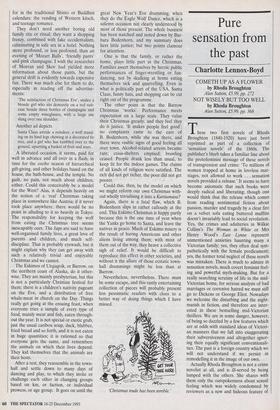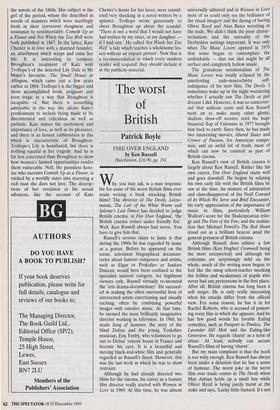Pure sensation from the past
Charlotte Lennox-Boyd
These two first novels of Rhoda Broughton (1840-1920) have just been reprinted as part of a collection of `sensation novels' of the 1860s. The publisher's blurb takes a familiar line about the protofeminist message of these novels of transgression and crime: `To millions of women trapped at home in loveless mar- riages, not allowed to work . . . sensation novels provided a release.' It seems to have become axiomatic that such books were deeply radical and liberating; though one would think that the release which comes from reading sentimental fiction about passion, murder and tragedy by a clear fire on a velvet sofa eating buttered muffins doesn't invariably lead to social revolution. Yes, the crimes and adulteries in Wilkie Collins's The Woman in White or Mrs Henry Wood's East Lynne represent unmentioned anxieties haunting many a Victorian family; yes, they often deal sym- pathetically with the female predicament; yes, the former total neglect of these novels was mistaken. There is much to admire in sensation novels, much covert feminist feel- ing and powerful myth-making. But for a really searching scrutiny of life in the mid- Victorian home, for serious analysis of bad marriages or corrosive hatred we must still go to Dickens or George Eliot. Nowadays we welcome the disturbing and the night- marish in fiction, and therefore are inter- ested in these bestselling mid-Victorian thrillers. We are in some danger, however, of being so dazzled by a few features which are at odds with standard ideas of Victori- an manners that we fall into exaggerating their subversiveness and altogether ignor- ing their equally significant conventionali- ties. The past is a foreign country which we will not understand if we persist in remodelling it in the image of our own.
Actually Rhoda Broughton is not a crime novelist at all, and is ill-served by being lumped with the others. She shares with them only the outspokenness about sexual feeling which was widely condemned by reviewers as a new and hideous feature of
the novels of the 1860s. Her subject is the girl of the period, whom she described in novels of manners which were startlingly fresh in their irreverent slanginess and resistance to sentimentality. Cometh Up as a Flower and Not Wisely but Too Well were both published in 1867. In the latter, Kate Chester is in love with a married bounder, an attachment which warps and ruins her life. It is interesting to compare Broughton's treatment of Kate with Trollope's of the deserted Lily Dale in Mr Major's favourite, The Small House at Allington, which came out a few years earlier in 1864. Trollope's is the bigger and more accomplished book, poignant and even tragic in a way that Broughton is incapable of. But there is something admirable in the way she allows Kate's predicament to include being made to be discontented and ridiculous as well as pathetic. Kate misses the excitement and importance of love, as well as its pleasures, and there is an honest ruthlessness in this which is characteristic of Broughton. Trollope's Lily is humiliated, but there is nothing squalid in her tragedy. And he is far less concerned than Broughton to show how women's limited opportunities render them vulnerable. Nell, the penniless hero- ine who narrates Cometh Up as a Flower, is tricked by a worldly sister into marrying a rich man she does not love. The descrip- tions of her revulsion at his sexual advances, like the account of Kate Chester's desire for her lover, were consid- ered very shocking in a novel written by a spinster. Trollope wrote generously to cheer Broughton up about the scandal: `There is not a word that I would not have had written by my sister, or my daughter if I had one.' He called Not Wisely but Too Well 'a tale which teaches a wholesome les- son without an impure picture'. Now that is a recommendation to which every modern reader will respond: they should include it in the publicity material.











































































































 Previous page
Previous page